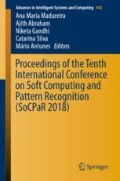Abstract
In this paper, a new efficient error correcting scheme for DNA archival digital data storage is proposed. We devise a double protection scheme for DNA oligos, aiming to ensure the protection of both information and indexing header data from both symbol flipping and erasure-burst errors, using two different cyclic ternary difference-set codes, which are known to be completely orthogonalisable and very easy to decode using a simple majority-logic decoding algorithm. We show that the proposed scheme is efficient and easily scalable, and provides a coding potential of 1.97 bit per nucleotide, and a reasonable net information density of 0.75 bit/nt under the considered experimental conditions, with relatively a lower decoding complexity and costs compared to other DNA data storage approaches.
Access this chapter
Tax calculation will be finalised at checkout
Purchases are for personal use only
References
Reinsel, D., Gantz, J., Rydning, J.: Data age 2025: the evolution of data to life-critical. Don’t Focus on Big Data (2017)
Baum, E.B.: Building an associative memory vastly larger than the brain. Science 268(5210), 583–585 (1995)
Goldman, N., Bertone, P., Chen, S., Dessimoz, C., LeProust, E.M., Sipos, B., Birney, E.: Towards practical, high-capacity, low maintenance information storage in synthesized DNA. Nature 494(7435), 77 (2013)
Church, G.M., Gao, Y., Kosuri, S.: Next generation digital information storage in DNA. Science 337(6102), 1628 (2012)
Limbachiya, D., Dhameliya, V., Khakhar, M., Gupta, M.K.: On optimal family of codes for archival DNA storage. arXiv preprint arXiv:1501.07133 (2015)
Grass, R.N., Heckel, R., Puddu, M., Paunescu, D., Stark, W.J.: Robust chemical preservation of digital information on DNA in silica with error-correcting codes. Angew. Chem. Int. Ed. 54(8), 2552–2555 (2015)
Blawat, M., Gaedke, K., Hutter, I., Chen, X.-M., Turczyk, B., Inverso, S., Pruitt, B.W., Church, G.M.: Forward error correction for DNA data storage. Procedia Compute. Sci. 80, 1011–1022 (2016)
Bornholt, J., Lopez, R., Carmean, D.M., Ceze, L., Seelig, G., Strauss, K.: A DNA based archival storage system. ACM SIGOPS Oper. Syst. Rev. 50(2), 637–649 (2016)
Jain, S., Hassanzadeh, F.F., Schwartz, M., Bruck, J.: Duplication-correcting codes for data storage in the DNA of living organisms. In: 2016 IEEE International Symposium on Information Theory (ISIT), pp. 1028–1032. IEEE (2016)
Erlich, Y., Zielinski, D.: DNA fountain enables a robust and efficient storage architecture. Science 355(6328), 950–954 (2017)
Erlich, Y., Zielinski, D.: Capacity-approaching DNA storage. bioRxiv, pp. 074237 (2016)
Heider, D., Barnekow, A.: DNA-based watermarks using the dna-crypt algorithm. BMC Bioinf. 8(1), 176 (2007)
Weldon Jr., E.J.: Difference-set cyclic codes. Bell Syst. Tech. J. 45(7), 1045–1055 (1966)
Rudolph, L.D.: Geometric configurations and majority logic decodable codes. Ph.D. thesis, MEE-University of Oklahoma (1964)
Lucas, R., Fossorier, M.P.C., Kou, Y., Lin, S.: Iterative decoding of one-step majority logic decodable codes based on belief propagation. IEEE Trans. Commun. 48(6), 931–937 (2000)
Kou, Y., Lin, S., Fossorier, M.P.C.: Low-density parity-check codes based on finite geometries: a rediscovery and new results. IEEE Trans. Inf. Theor. 47(7), 2711–2736 (2001)
Singer, J.: A theorem in finite projective geometry and some applications to number theory. Trans. Am. Math. Soc. 43(3), 377–385 (1938)
Shu, L., Costello, D.J.: Error Control Coding. The Second International edition, Prentice-Hall, pp. 704–712 (2004)
Ryan, W., Lin, S.: Channel Codes: Classicaland Modern. Cambridge University Press, Cambridge (2009)
Author information
Authors and Affiliations
Corresponding author
Editor information
Editors and Affiliations
Rights and permissions
Copyright information
© 2020 Springer Nature Switzerland AG
About this paper
Cite this paper
Yatribi, A., Belkasmi, M., Ayoub, F. (2020). An Efficient and Secure Forward Error Correcting Scheme for DNA Data Storage. In: Madureira, A., Abraham, A., Gandhi, N., Silva, C., Antunes, M. (eds) Proceedings of the Tenth International Conference on Soft Computing and Pattern Recognition (SoCPaR 2018). SoCPaR 2018. Advances in Intelligent Systems and Computing, vol 942. Springer, Cham. https://doi.org/10.1007/978-3-030-17065-3_23
Download citation
DOI: https://doi.org/10.1007/978-3-030-17065-3_23
Published:
Publisher Name: Springer, Cham
Print ISBN: 978-3-030-17064-6
Online ISBN: 978-3-030-17065-3
eBook Packages: Intelligent Technologies and RoboticsIntelligent Technologies and Robotics (R0)

